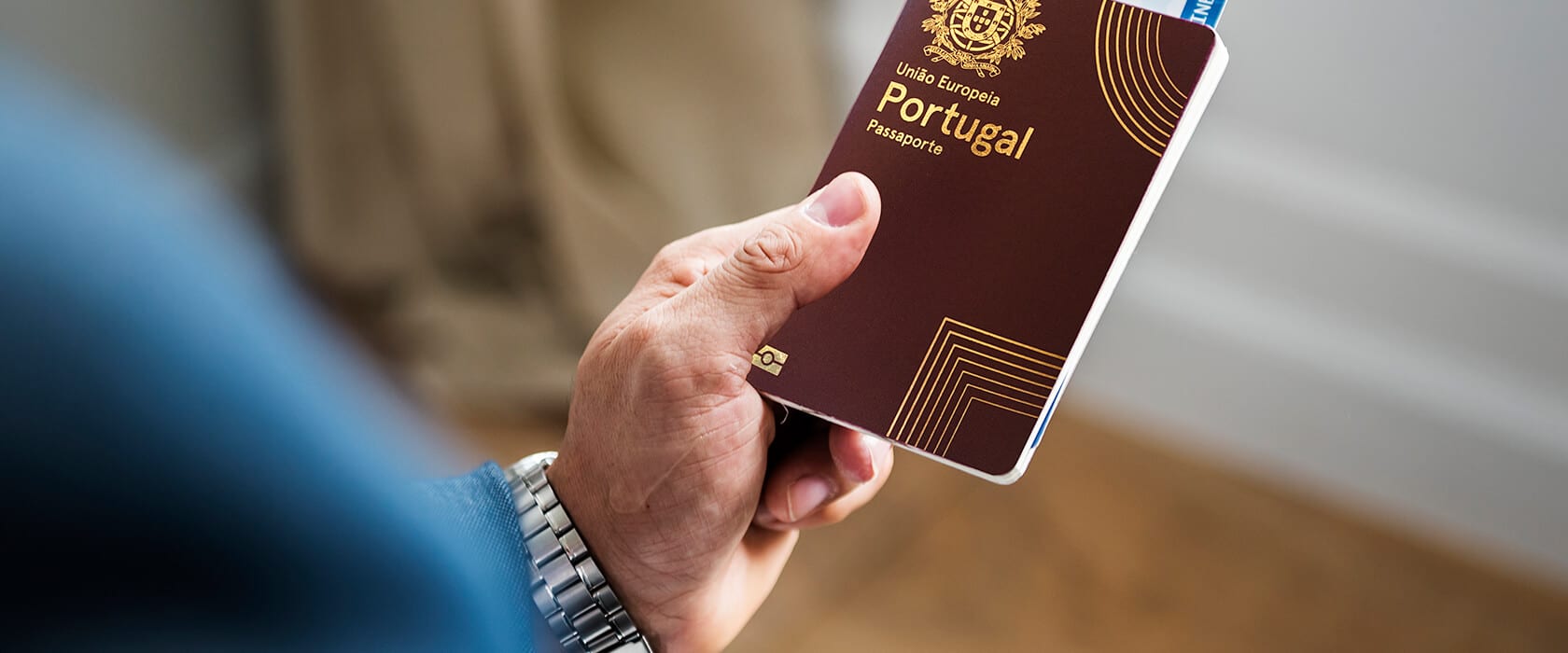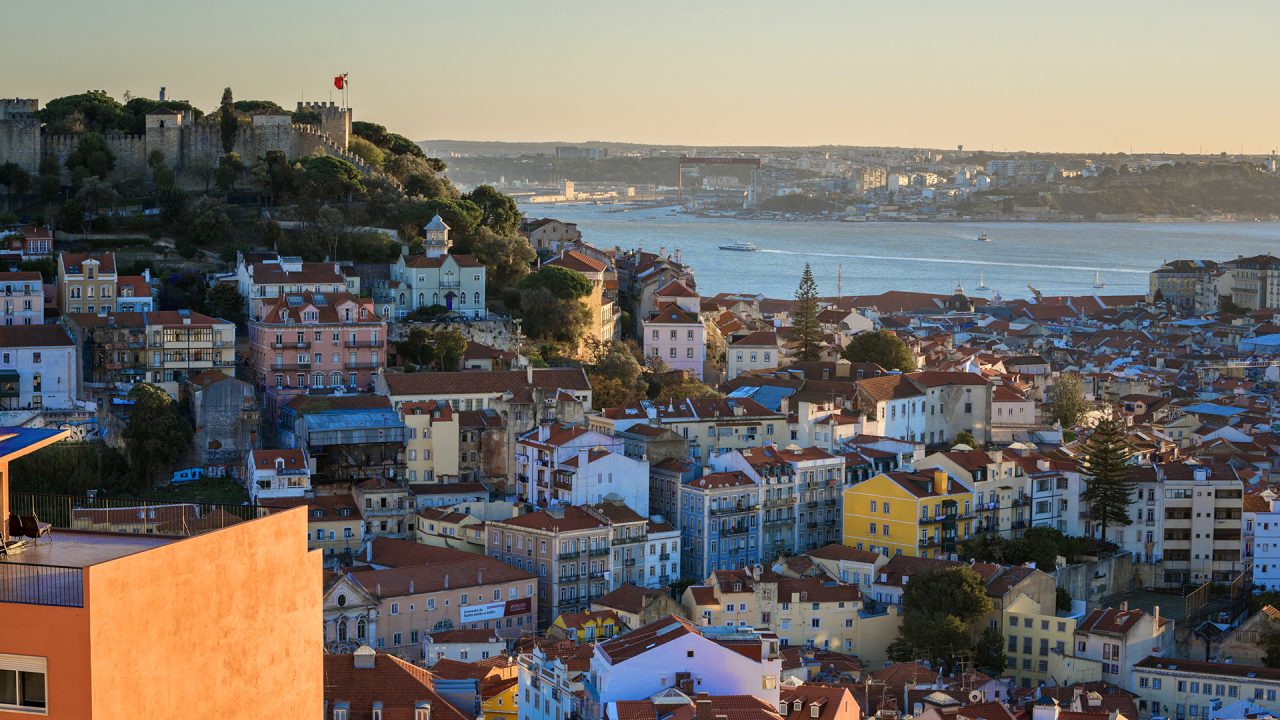Relocating to Portugal is unfortunately not as simple as packing a bag and hopping on a flight. To wake up bathed in the warm Portuguese sun or lounge on the glistening beaches, there are a few steps to take first. The process may seem overwhelming, but don’t worry—we’re here to simplify it for you. Here is what to know about moving to Portugal.

Moving to Portugal Pros and Cons
So, why is everyone moving to Portugal? Is moving to Portugal a good idea? We already know the answer, but let’s take a quick look at our moving to Portugal pros and cons list to see if the country is a good fit for you.
Pros of relocating to Portugal
- Sunny weather for most of the year (more than 300 days per year)
- A relaxed, laid-back lifestyle
- Friendly locals
- The beaches of your dreams
- 51 Excellent international schools in Lisbon, Porto, and the Algarve region (mainly)
- A huge expat network (over one million expats currently live in Portugal!)
- A stable economy
- A well-run Portuguese healthcare system with affordable private health insurance
- Low cost of living compared to the US, UK, and most countries in Western Europe
- Some of the best food in the world, with Lisbon’s Portuguese cuisine holding the title of Europe’s best culinary city destination for 2024
- Portuguese people speak English very well in the major cities. So, it’s easy to get by even if you don’t know the Portuguese language very well
- Extremely safe (Portugal ranks seventh on the 2024 Global Peace Index)
Some of the advantages we mentioned could also be disadvantages of living in Portugal if it is not to your taste, such as the climate or the relaxed pace of life. So, even our list is relative. In the interest of fairness, here are some other cons to consider.
Cons of relocating to Portugal
- The need for learning Portuguese in towns with fewer expats
- Difficulties paying by card since you’ll find a few shops that don’t accept Visa or Mastercard, so you’ll need to keep a stash of cash on you just in case
- Rainy winter months can get chilly if your home is not well insulated
- The pace of life could be too slow for some and may take some getting used to

Requirements for Moving to Portugal
The requirements for immigrating to Portugal will depend on a few different things, like how long you intend to stay there, the country you will be coming from, and what you intend to do in Portugal. Let’s break down the different requirements to keep in mind.
Portugal in the EU and the Schengen Area
Portugal has been part of the European Union (EU) since 1 January 1986. That means that starting that day, Portugal accepted, and was accepted, in a free commerce, free transportation of goods and free circulation zone.
On June 25, 1991, Portugal signed the Schengen Agreement, eliminating border controls for citizens of other European countries that are also part of the agreement.
So basically, people from Portugal can easily (and without the need for a visa!) visit any other EU country and/or a country in the Schengen Area (and vice versa) for up to 90 days.
Countries outside the EU or the Schengen Area
When visiting any country in the EU or Schengen Area for 90 days or less, Schengen Area requirements are in order. Given these requirements, we can classify the countries outside the EU or the Schengen Area in two categories: Those who need a Schengen Visa and those who don’t need a Schengen Visa.
While many countries will need to apply for this visa in order to visit and enter Portugal, even for short stays, citizens of certain countries, including the United States, Canada, Australia, New Zealand, Japan, South Korea, and the UK, among others, can enter Portugal and the rest of the Schengen Zone for up to 90 days without a Portuguese visa for purposes such as tourism, business, or family visits.

Applying for a visa
There is a range of visa options made available by the Portuguese government for expats from non-EU countries who want to live, work, and study in Portugal. Here are main visas and residence permits available to help you on your mission of relocating to Portugal:
- Portugal Golden Visa – Investment visa: A five-year Portuguese residency by investment program
- Portugal D2 Visa – Entrepreneur visa: Designed for aspiring entrepreneurs who want to start a business in Portugal or for self-employed individuals looking to expand into Portugal.
- Portugal D7 Visa – Retirement / passive income visa: Those who earn a regular passive income from pensions, rental income, financial investments, or other sources can apply for this visa.
- Portugal D8 Visa – Portugal Digital Nomad Visa: A visa tailored to self-employed applicants or digital nomads working remotely
- Student Visa: International students living outside the EU who have been accepted into a study program at a Portuguese educational institution will qualify for this one.
- Work Visa: A Portugal resident permit for work is an option if you have been offered an employment contract in Portugal.
- Temporary Residence Permit: A temporary Portugal residence permit is for foreigners who intend to live in Portugal for a short period for a specific reason, for example, a temporary Portuguese residence permit for scientific research, a long-term study program, or for family reunification.
- Permanent Residence Permit: Permanent residency permits are for foreigners who want to live in Portugal indefinitely. The requirements to obtain permanent residency (and also to become a Portuguese citizen) include holding a temporary residency permit, and you must have lived in Portugal for 5 years.
Here are the general document requirements to move to Portugal when applying for a Portugal visa for residency:
- Official application form
- Two passport-size photos
- A passport valid for at least three months beyond your stay
- Travel insurance
- A copy of your return ticket (depending on your nationality) and your flight details
- Proof of accommodation for your stay in Portugal
- Proof that you have enough money to support yourself
- Evidence of your financial status (like tax returns or employment details)
- Proof of civil status (like a marriage certificate, if applicable)
- Any additional documents based on your chosen visa type, such as a work contract, university enrollment, or proof of investment for the Golden Visa
Depending on the visa you apply for and your home country, the required documentation might differ. You can find all the additional information about which documents you may need at the Ministry of Foreign Affairs. If you are considering relocating to Portugal, or perhaps even seeking eventual Portuguese citizenship, and would like to discuss which visa option is best for you, Global Citizen Solutions has friendly experts who are willing to help guide you.

Relocating to Portugal from USA
If you are thinking about how to move to Portugal from the US, you should know that the above rules also apply to you. But let’s go through relocating to Portugal from USA soil step by step.
Coming from the US
If you are a citizen of the US thinking about a move to Portugal, the first thing you should do is to go to the Portuguese Embassy or local Portuguese Consulate in your area of residence and apply for one of the Portuguese visa options.
Once you have qualified for a visa, you will be able to start planning to move to Portugal, including confirming your accommodations, booking your flights, and arranging for international moving companies to transport the belongings you cannot take with you on your flight. Then, it’s just about enjoying your new life living in Portugal!
What about other countries?
If you are coming from any other country not in the EU, the EEA or Schengen area, the same rules should apply, but you should check with the Embassy of Portugal or Consulate General of Portugal in your country to be sure.

What to do after arriving in Portugal?
The first step in the journey is to get yourself set up. That means that, if you come from the EU, you should ask for the Certificate of Registration of Citizen of the EU at your local town hall. If, on the other hand, you come from a country outside the EU, you should make an appointment with the Agency for Integration, Migration and Asylum – AIMA (Agência para a Integração, Migrações e Asilo) and get your residency permit.
Following that, you will have to go to the local tax office (Finaças) and apply for a tax identification number (called the Número de Identificação Fiscal or NIF) to be able to open a Portuguese bank account, pay tax, and keep your tax benefits and responsibilities in check. There is also another easy way to obtain your NIF. You can simply obtain your NIF at the click of a button with a third-party provider, read more about how to get a NIF Portugal number here.
The last checkpoint is filing the documentation for your social security number (called the Número de Identificação de Segurança Social or NISS) in order to be covered by the Portuguese Social Security and enjoy the benefits of Portugal’s fantastic healthcare system. If you work for a Portuguese company, they usually help to secure one for you on your behalf.
Other logistics to get you settled
- Customs: If you’re shipping your belongings to Portugal, you’ll need to be there for inspection, provide a detailed inventory for a Certificado de Bagagem (luggage certificate), and make sure you’re not bringing anything prohibited—like weapons, drugs, or perishable foods. The good news? Household items you’ve owned for over a year are tax-free, but you might have to pay duties on alcohol, tobacco, antiques, and vehicles.
- Shipping and flying goods: Choose between affordable sea freight (1–3 months) or faster but costlier air freight (a few days) to transport your belongings to Portugal.
- Storage: Self-storage is easy to find in bigger cities. Compare prices and book in advance to make sure you get the best deal.
- Bringing pets: You can bring up to five furry friends, but they’ll need a European pet passport, a microchip, and proof of rabies vaccination. If you have a breed classified as “dangerous,” check the special regulations before you go.
- Vaccinations: There aren’t any required vaccinations for moving to Portugal, but it’s always a good idea to check with your doctor. Depending on your lifestyle, they might recommend Hepatitis A/B or rabies shots.

Is moving to Portugal hard?
Moving to Portugal is no harder than moving to any other country in the EU or the Schengen Area. Though it may seem like there are a lot of rules, if you follow our tips, it will make relocation to Portugal a whole lot easier. In fact, Portugal is generally considered to be one of the easiest countries to relocate to.
Relocating to Portugal gives you the opportunity to move to Portugal and grow as a dependent or independent worker, as an entrepreneur, or as an investor. It’s also the perfect place to spend a peaceful retirement after a rewarding career. Once you get the process started, it really isn’t as hard as you would think. Also, it is completely worth it, considering the low cost of living, high quality of life, stunning landscapes and surroundings, and a heartwarming Portuguese culture that is sure to get under your skin (in a good way).
Frequently Asked Questions about Moving to Portugal
What are the steps to move to Portugal from the USA?
American expats just looking to move to Portugal from the US for 90 days or less will be able to do so without a visa. However, to immigrate to Portugal from US soil long-term, American expats can apply for one of the various visa options, including the Portugal Golden Visa Program, the D2 Visa, D7, Visa and D8 Visa (Digital Nomad Visa). From there, you’ll just need to make sure you’ve got suitable accommodation and find some reliable international moving companies to transport your belongings.
How can I relocate to Portugal from the UK?
Since Brexit, UK citizens wishing to relocate to Portugal long term will need to apply for one of Portugal’s visa options, For example the Portugal Golden Visa, entrepreneur (D2) visa, passive income (D7) visa or digital nomad (D8) visa. The requirements for UK citizens will be the same as the requirements for Portugal immigration from USA soil.
What documents are required for moving to Portugal?
Your “Moving to Portugal Checklist” for getting a visa and immigrating to Portugal should include the following documents:
- Official visa application form
- Two passport-size photos
- A valid passport (valid for at least three months beyond your stay)
- Travel insurance
- A copy of your return ticket (depending on your nationality) and your flight details
- Proof of accommodation for your stay in Portugal
- Proof that you have enough money to support yourself
- Evidence of your financial status (like tax returns or employment details)
- Proof of civil status (like a marriage certificate, if applicable)
- Any additional documents based on your chosen visa type, such as a work contract, university enrollment, or proof of investment for the Golden Visa
What are the best cities to relocate to in Portugal?
Lisbon is quite a popular Portuguese city for many American expats and their families, especially given the good international schools in the area. Porto, Cascais, and cities in the Algarve region are also popular Portuguese cities and are considered some of the best cities to live in Portugal among expats when deciding on an area to settle.
What are the benefits of moving to Portugal?
An affordable cost of living for a European country, excellent healthcare (both public and private healthcare), rich history and culture, ease of travel, low crime rates, excellent food, and over 300 days of sunshine per year are the main perks of living in Portugal.
How does Portugal’s Golden Visa program work?
To qualify for the Golden Visa program, you will need:
- A clean criminal record
- Be a non-EU, non-Swiss, and non-EEA national
- Make an investment of at least €250,000
- Spend an average of seven days per year in Portugal.
Can American citizens move to Portugal?
Yes, American citizens can move to Portugal. However, you must apply for the appropriate visa or residence permit depending on your reason for relocation, such as work, study, retirement, or investment (via the Golden Visa program). However, Americans seeking a short visit can stay in Portugal for up to 90 days within a 180-day period without a visa.
How much money do you need to immigrate to Portugal?
The amount of money needed to immigrate to Portugal varies depending on your circumstances and the route you plan to take to get a visa. For example, Golden Visa applicants will need to invest €250,000–€500,000 (depending on the type of investment), while retirees will need to prove a minimum income of €870 per month to qualify for the D7 Visa.
General living costs will also vary by location, but a single person might need around €1,200 to €1,500 per month to live comfortably, excluding rent. This will of course depend on the location in Portugal, as cities such as Lisbon and Porto will have higher living costs.
Can Americans apply for the Portugal Golden Visa?
Yes! The Portugal Golden Visa is available to Americans, allowing residency through investment. However, it’s worth keeping in mind that the popular real estate route has been removed, but other investment options, like funding local businesses or venture capital, remain available.
Is healthcare in Portugal free?
Healthcare in Portugal is not entirely free for everyone, although it is free for certain age groups (minors below 18 years and seniors over 65 years old) if you have a European health insurance card. However, it is highly subsidized and affordable regardless. Many expats also opt for private health insurance to access faster care.
Is an American driver’s license valid in Portugal?
An American driver’s license is valid in Portugal for up to 185 days (about six months) after arrival. After that, you’ll need to apply to exchange it for a Portuguese driver’s license or obtain a new one.
Is Portugal a safe country?
Yes, Portugal is considered one of the safest countries in the world, ranking seventh in the 2024 Global Peace Index. It has low crime rates, and violent crime is very rare. However, like anywhere, petty theft and pickpocketing can occur in tourist-heavy areas, so it’s important to stay vigilant.
Is it safe to drive in Portugal?
Driving in Portugal is generally safe, but it can be challenging in cities due to narrow streets and heavier traffic. Rural areas and highways are well-maintained and easier to navigate.
What are the cons of moving to Portugal from the USA?
While Portugal offers many benefits, there are some challenges to consider:
- Bureaucracy: The visa and residency process can be slow and complex.
- Language barrier: Portuguese is the official language, and while English is widely spoken in popular expat areas like Lisbon and Porto, not everyone speaks English fluently in the more rural areas.
- Lower salaries: Salaries in Portugal are generally lower than in the US (but the cost of living is significantly lower too!)
How long can a US citizen live in Portugal?
A US citizen can stay in Portugal for up to 90 days without a visa. For longer stays, you’ll need to apply for a residence permit, such as a retirement visa, or Golden Visa.
How many American expats live in Portugal?
As of recent estimates, there are over 14,000 American expats living in Portugal. The number has been steadily increasing due to Portugal’s affordable cost of living, high quality of life, and welcoming attitude toward foreigners.
Can I retire to Portugal from the USA?
Yes, Americans can retire to Portugal. Portugal offers a retirement visa (D7 Visa) if you have sufficient passive income, such as pension income or savings. You will need to prove that you meet the minimum income requirement (€870 per month) in order to qualify. Retirees can also opt for the Golden Visa if you prefer the residency-by-investment route.
Do American expats need insurance in Portugal?
While public healthcare is available to residents, many American expats opt for private health insurance to cover additional services, reduce wait times, and access more English-speaking doctors. Health insurance is also required for visa applications.
Where do most American expats live in Portugal?
American expats tend to settle in cities and regions known for their expat-friendly communities, including:
- Lisbon: The capital city, offering vibrant culture, a good Portuguese job market for work opportunities, and a bustling expat scene
- Porto: Known for its historic charm and lower cost of living compared to Lisbon
- Algarve: A popular region for retirees, famous for its beaches and warm Mediterranean climate. Within the Algarve, Lagos is a particularly attractive destination trending among expats at the moment.
- Cascais and Sintra: Coastal towns near Lisbon, popular for their scenic beauty and relaxed lifestyle







